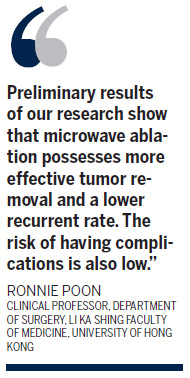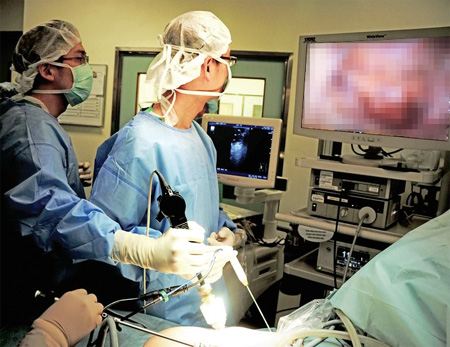New treatment to benefit liver cancer patients
Updated: 2011-03-31 07:04
By Michelle Fei(HK Edition)
|
|||||||||
|
Doctors at the Queen Mary Hospital perform newly introduced Novel Microwave Ablation Therapy on a patient suffering liver cancer. Provided To China Daily |

A revolutionary treatment for cancer of the liver, described as safer and more effective, has been introduced in Hong Kong.
Novel Microwave Ablation Therapy is considered especially helpful in the treatment of the liver cancer patients whose tumors are unable to be removed by surgery.
The treatment, offered for the first time in Asia, is available at the Queen Mary Hospital at no charge.
Surgical fees are subsidized by the treatment's American originator while the procedures undergo clinical trials, Ronnie Poon, clinical professor of the Department of Surgery at the University of Hong Kong's Li Ka Shing Faculty of Medicine, said on Wednesday at a news conference.
"Preliminary results of our research show that microwave ablation possesses more effective tumor removal and a lower recurrent rate. The risk of having complications is also low," said Poon.
He heads a clinical study on the new treatment at the Queen Mary Hospital that began in 2010.
For liver cancer patients suffering from unresectable tumor, whose liver function was too poor for the operation, the costs of primary treatments, such as surgical resection and liver transplantation, became prohibitive.
Meanwhile, alternative treatments, such as radiotherapy, were less effective when tumors were located near blood vessels, said Poon.
The mechanism of the new microwave ablation therapy is to kill liver tumors with heat energy generated through the interaction between water molecules and microwaves.
The treatment is capable of applying constant heat on larger areas, thus killing tumors more effectively and leaving fewer side effects to nearby vessels, said Poon.
Eighteen Hong Kong patients, aged 41 to 75, have received the microwave treatment at the Queen Mary Hospital since late 2010.
Generally, operating time was significantly reduced to an average of 8.5 minutes.
Tumors averaging around three millimeters were eradicated in about 12 minutes, compared with 36 to 48 minutes under current radiotherapy.
Microwaves are also capable of completely killing tumors larger than five millimeters, which is beyond the capacity of radiotherapy.
No complications or postoperative morbidity was observed, said Poon.
"The microwave treatment is not perfect. Patients could die from infection if it was conducted inappropriately," said Poon's colleague, Assistant Professor Albert Chan.
What's more, microwave ablation therapy cannot be conducted on intestines. And it is unable to kill tumors larger than 20 millimeters.
The charge for the new treatment after clinical trials is expected to be roughly HK$10,000, about the same as radiotherapy, said Poon.
China Daily
(HK Edition 03/31/2011 page1)
